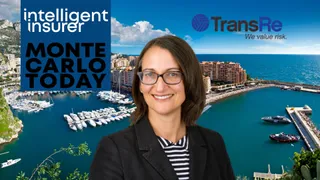
London has to ‘stay on its game’ to maintain its innovative edge: TransRe
The risks businesses face today look very different from a generation ago. Around 80 percent of large corporates’ exposures now lie in so-called intangible assets such as cyber, intellectual property and reputational risk—areas where traditional re/insurance has struggled to keep pace. Louise Rose, president of TransRe’s international division, argues that closing this protection gap will demand innovation, and that the London Market can and should lead from the front on this.
Key points:
Intangibles now 80% of exposure
London must innovate
Claims expertise differentiates
London-based Rose has seen the market’s relevance ebb and flow through her career. She believes it is in a good place. But maintains that innovation, the thing that built London as a risk-transfer hub in the first place, will also be key to a vibrant future.
“There is no room for complacency”
“London has always been strong on product development and innovation, especially in Lloyd’s,” she says. “On top of that, we have a very trusted legal and regulatory environment, which is important. It is the bedrock of what we do. We also have so much talent.
“But there is no room for complacency. There’s been massive growth in some of the regional hubs outside of London: Bermuda, Zurich, Dubai, Singapore. And they’re developing all the time. They’re getting stronger all the time. London has challenges: costs is one. So, London has to stay on its game and remember what made it so strong in the first place.”
She stresses that the fast-changing nature of risk makes this more important than ever. She notes that a very high percentage – as much as 80 percent – of the asset base of Dow Jones companies today is made up of intangible assets. That is creating a growing protection gap. London is best placed to fill this – and it can also ensure its status on the back of that.
Widening protection gap
“There’s a big gap, and the gap’s widening,” she says. “I don’t want to say we’re running away from risk, but I’m not quite sure that we’re evolving the product as quickly as we did in the past. That’s something that London was strong at: niche business and specialist businesses. That has to be one of the focuses for maintaining relevance going forward.”
She notes that a further benefit to this approach is the way diversification serves to counter the market’s cyclical nature – with pricing fluctuating in the core property/casualty lines. “One way to hedge against this almost inevitability of the cycle is to broaden your products. Then maybe we’ll stop being as competitive on that core P&C piece as we are, as the market has been.”
TransRe is broadening its product base, partly with this in mind. Its trade credit, terrorism, and political risk units offer diversification – but they have too had to evolve in the light of geopolitical shifts and volatility. Marine and aviation also represent a strength, with much of that business flowing through London.
She also explains how London fits into the group’s global footprint. She describes the distribution as critical but says TransRe is completely agnostic where it writes business. “We have this global footprint, and we have core lines represented everywhere. But a big part of what we’re doing is trying to make sure that we’re getting all of our expertise to our clients wherever they want to access us.
“London is a very, very important part of that, not just because of the business that we write in there, but because of the expertise London could transfer elsewhere within our group. I do think that London can help solve global problems.”
Commoditisation a challenge
She also discusses how a large reinsurer like TransRe, with such a strong Berkshire-Hathaway-backed balance sheet, can set itself apart from competitors. She describes commoditisation as being a real challenge in the market. But not all forms of capital can offer expertise – as well as a long-term partnership.
“There’s lots of other forms of capital out there, and that’s really healthy. But I do think the rated balance sheets haven’t necessarily sold their proposition as well as they could have done. ‘A’ rated player offers capital that is generally, I’ll call it a little bit stickier. I don’t mean by that that non-rated balance sheets are here today, gone tomorrow.
“But the rated balance sheet isn’t having to raise capital every year as part of an ongoing plan. We have to deliver a return for it. We have to make it profitable over time. But generally speaking, it’s a little bit stickier. And our claims team globally are amongst the best in business. That is how, even in a commoditised business, we can still differentiate ourselves. How you handle claims is one of the biggest marketing tools that you have in your business. I do think ours are amongst best of business.”
Claims and expertise, she reiterates, are two key ways TransRe sets itself apart. “Our clients don’t need us to explain products to them, but they do need us to understand their products. And again, this is where maybe specialty lines is a little bit different. We have that expertise. Equally, casualty is a big strength of ours, and we have a huge footprint in that.
“But anywhere where you have expertise, bring that to the conversation with the client so you understand what they’re selling. It gives you an edge then in trying to fashion and create solutions that work for them and for their client base. And that, at the end of the day, I think is how the business is transforming – for us and in the London Market. It is where innovation starts!”
For more news from Monte Carlo Today, click here.
Did you get value from this story? Sign up to our free daily newsletters and get stories like this sent straight to your inbox.
Editor's picks
Editor's picks
More articles
Copyright © intelligentinsurer.com 2024 | Headless Content Management with Blaze

